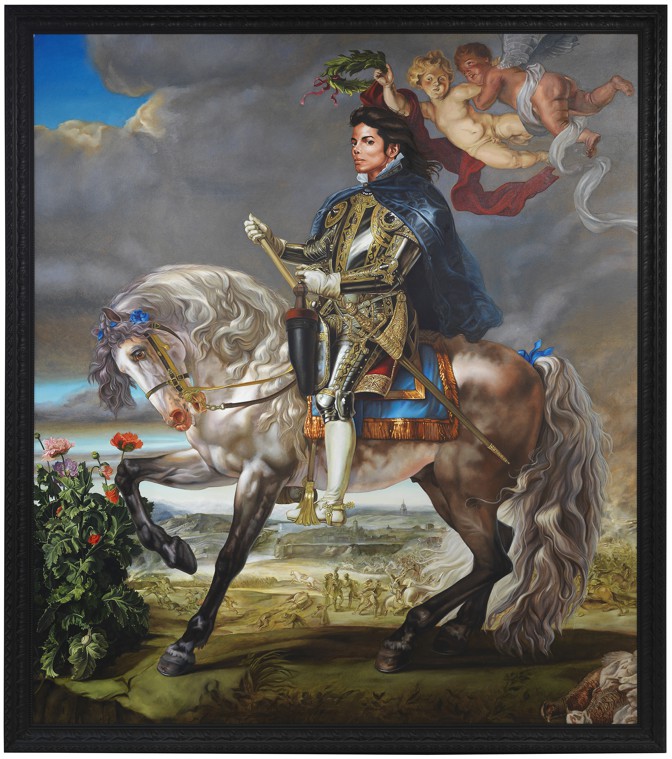
The cynosure of Versailles, Louis represents the tendency of whatever is interesting in politics and theater to coalesce in one place, one person. We've tried separating church and state, but we still read the news because it's interesting, though part of what is interesting about it is that it might be true. We still believe in things enough to give them our attention, or seek distraction in them from the things we can't help but believe. And we still revere kings, just in another sphere: entertainment--
(Google images for "King of Pop" or "King James," "The Crown," etc.)
Since around the spring, I've been reading more of the news, mostly just The Atlantic and whatever they link to. Still, I prefer books to the news, and say so to anyone who will listen.
Lately, listening to books rather than podcasts while going about the household chores, I'm trying to catch up on The Master and Margarita, the Table and Chairs seminar's summer reading, and so I include a passage from it on the other end of the Plutarch I've been thinking about in this connection:
Thespis was now beginning to develop tragedy, and the attempt attracted most people because of its novelty, although it was not yet made a matter of competitive contest. Solon, therefore, who was naturally fond of hearing and learning anything new, and who in his old age more than ever before indulged himself in leisurely amusement, yes, and in wine and song, went to see Thespis act in his own play, as the custom of the ancient poets was. After the spectacle, he accosted Thespis, and asked him if he was not ashamed to tell such lies in the presence of so many people. Thespis answered that there was no harm in talking and acting that way in play, whereupon Solon smote the ground sharply with his staff and said: "Soon, however, if we give play of this sort much praise and honour, we shall find it in our solemn contracts."As long ago as that, we recognized the danger of conflating politics and entertainment; the very next paragraph, with Pisistratus' self-wounding for attention and bodyguards, shows the utility of the same. But the main thing seems to be that it's interesting. Here's Bulgakov:
'But this is the question that disturbs me--if there is no God, then who, one wonders, rules the life of man and keeps the world in order?'
'Man rules himself,' said Bezdomny angrily in answer to such an obviously absurd question.
'I beg your pardon,' retorted the stranger quietly, 'but to rule one must have a precise plan worked out for some reasonable period ahead. Allow me to enquire how man can control his own affairs when he is not only incapable of compiling a plan for some laughably short term, such as, say, a thousand years, but cannot even predict what will happen to him tomorrow?'What happens to Bezdomny in just a few pages, of course, is that he slips on the spilled sunflower oil and gets decapitated by the streetcar.
The alternatives to political theater for our attention, whether religious, philosophical, poetic, scientific, all play themselves out within the limitations of our bodies and the aspirations of our minds. If we're able to transcend politics and the news media in their latest manifestations, it will be as much by telling a more interesting story about the drama of human activity as it will be by projecting long-term goals and reforming decrepit institutions.

No comments:
Post a Comment